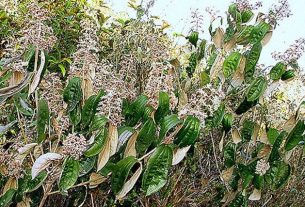Home remedies for stomach ulcers, such as potato juice, espinheira santa tea or marshmallow infusion, are great natural options for relieving ulcer symptoms, such as pain or a burning sensation in the stomach, nausea or vomiting. This is because these medicines contain substances with anti-inflammatory, antacid and antiemetic properties, which help reduce inflammation, acidity and protect the stomach mucosa.
Although they cannot replace medical treatment, home remedies are a good option to help alleviate stomach ulcer symptoms and can be used to complement the treatment recommended by your doctor.

Some home remedy options for stomach ulcers are:
1. Potato juice
A great home remedy for ulcers is to drink pure potato juice on an empty stomach as it is capable of reducing the amount of acid in the stomach, helping with the ulcer healing process and relieving symptoms such as pain, burning and heartburn.
Furthermore, potato juice is indicated to help treat other gastric problems such as poor digestion, gastritis or gastroesophageal reflux.
Ingredients
- 1 raw English potato;
- Water (100 to 200 mL).
Preparation mode
Peel the raw potato and place it in the processor, blender, centrifuge or mixer, and blend. Add a little water to make the juice more liquid and easier to drink. Then strain and drink the freshly prepared potato juice, 30 minutes before breakfast, without sweetening.
If you don’t have a food processor or blender, for example, you can grate the potato and squeeze it through a clean cloth, obtaining concentrated juice.
Potato juice should be used with caution by diabetic people, as it can increase the amount of sugar in the blood and cause uncontrolled blood sugar levels.
2. Espinheira-santa tea
Espinheira-santa tea, prepared with the medicinal plant Maytenus ilicifoliais rich in tannins, such as epigallocatechin, and polysaccharides, such as arabinogalactan, which help reduce stomach acidity and protect the stomach from the acid it produces, and can be used to help alleviate gastric ulcer symptoms such as pain or burning sensation in the stomach.
Some studies show that espinheira-santa tea has a similar effect to cimetidine, which is a medicine used to reduce the production of acid in the stomach. Discover the benefits of espinheira-santa.
Ingredients
- 1 teaspoon of dried espinheira-santa leaves;
- 1 cup of boiling water.
Preparation mode
Add the espinheira santa leaves to the boiling water, cover and let it rest for about 10 minutes. Strain and drink warm, up to 3 times a day, 30 minutes before meals.
3. Ginger tea
Ginger tea contains gingerol, chogaol and zingerone, which are substances with anti-inflammatory and antiemetic properties, which help to relieve stomach inflammation and reduce stomach acidity, reducing gastric ulcer symptoms such as a burning sensation in the stomach, nausea or vomiting. Discover other benefits of ginger.
This tea should not be taken by people who have active stomach bleeding caused by ulcers, or by people who are using anticoagulant medications, as ginger has anticoagulant properties that can cause or increase the risk of bleeding and hemorrhage.
Ingredients
- 1 cm of ginger root, cut into slices or grated;
- 1 liter of boiling water.
Preparation mode
Bring the water to a boil and add the ginger. Let it boil for 5 to 10 minutes. Remove the ginger from the cup and drink the tea in 3 to 4 divided doses throughout the day, 20 minutes before a meal.
Another option for making tea is to replace the root with 1 teaspoon of powdered ginger.
4. Licorice tea
Licorice tea has glycyrrhizin in its composition, which is a substance that helps reduce acidity and protect the stomach mucosa, and can be very useful as a home remedy for gastric ulcers and to relieve the burning sensation in the stomach. Additionally, licorice can help fight bacteria Helicobacter pyloriby decreasing its adhesion to stomach cells.
Ingredients
- 1 teaspoon of licorice root;
- 1 cup of boiling water;
- Honey to sweeten to taste.
Preparation mode
Add the licorice to the cup of boiling water, cover and let it rest for 10 minutes. Strain and sweeten with honey if desired. Drink this tea up to 2 times a day.
Licorice tea should not be consumed by pregnant or breastfeeding women and by people with heart problems.
5. Pheno grego
Fenugreek is a medicinal plant of the species Trigonella fenugreekwhose seeds have anti-inflammatory and antiulcer properties, which can help reduce stomach acidity, making it a good option for a home remedy for ulcers.
Furthermore, some studies show that fenugreek tea has a similar effect to omeprazole, which is a medicine used to reduce the production of acid in the stomach. However, this study was carried out in rats, and more studies are needed to prove this benefit. See other health benefits of fenugreek.
Ingredients
- 1 tablespoon of fenugreek seeds;
- 2 cups of water.
Preparation mode
Boil the ingredients for 5 to 10 minutes. Then strain and drink when warm about 3 times a day.
Fenugreek tea should not be used by pregnant women as it can stimulate uterine contractions and induce labor. This plant should also not be used by children, or by people undergoing cancer treatment who are sensitive to hormones, such as breast or prostate cancer, for example.
6. Mastic tea
Aroeira tea, prepared with the bark of the medicinal plant Schinus terebinthifoliushas analgesic, anti-inflammatory and antacid properties, being useful for relieving the symptoms of gastric ulcers, by reducing stomach acidity.
Ingredients
- 3 to 4 pieces of mastic bark or 100 g of mastic bark powder;
- 1 liter of water.
Preparation mode
Boil the ingredients for about 10 minutes, let it cool, strain and drink 1 tablespoon of the tea, up to 3 times a day.
Aroeira tea should not be used by children or pregnant women. Furthermore, when used in quantities greater than those recommended, it can cause diarrhea due to its laxative effect, and can also cause allergic reactions.
7. Peppermint tea
Peppermint tea, with its scientific name Mentha piperita L., is rich in volatile oils such as menthol and menthone, which have anti-inflammatory, antispasmodic, calming and analgesic properties, which help to relieve stomach pain and reduce other symptoms of gastric ulcers, such as nausea or vomiting.
Ingredients
- 6 chopped peppermint leaves;
- 150 mL of boiling water.
Preparation mode
In a cup, add the water over the chopped peppermint leaves, cover and let it rest for 5 to 7 minutes. Strain, sweeten with honey if desired, and drink 3 to 4 cups a day, right after meals.
8. Alteia infusion
The marshmallow infusion, also known as malva-branca or marshmallow, must be prepared using the root of the medicinal plant. Althaea officinalis. This plant has an emollient, anti-inflammatory, softening, calming and stomach-protective effect, making it another excellent option for a home remedy for gastric ulcers.
Ingredients
- 1 tablespoon of marshmallow root;
- 1 cup of boiling water.
Preparation mode
Add the marshmallow root to the cup of boiling water and let it rest for 10 minutes. Strain and then drink up to 2 cups per day.
9. Watermelon juice
Watermelon juice is an excellent option for a home remedy for gastric ulcers because watermelon is rich in magnesium, which is one of the components of antacid medications, which helps reduce stomach acidity and reduce ulcer symptoms.
Ingredients
- 3 medium slices of watermelon.
Preparation mode
Blend the watermelon in a blender until you obtain a homogeneous mixture. Drink the juice twice a day.

Sign up for our newsletter and stay up to date with exclusive news
that can transform your routine!
Warning: Undefined array key "title" in /home/storelat/public_html/wp-content/plugins/link-whisper-premium/templates/frontend/related-posts.php on line 12
Warning: Undefined array key "title_tag" in /home/storelat/public_html/wp-content/plugins/link-whisper-premium/templates/frontend/related-posts.php on line 13



